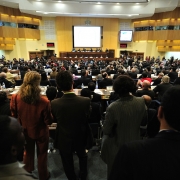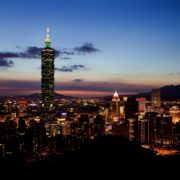Who is U Thant?
Topic of Study [For H1/H2 History Students]:
Paper 1: Safeguarding International Peace and Security
Section B: Essay Writing
Theme III Chapter 2: Political Effectiveness of the UN in maintaining international peace and security
Background
U Thant (သန့်) was appointed Secretary-General of the United Nations on 30 November 1961. It was six weeks after the distinguished Dag Hammarskjöld died in an air crash. U Thant was the first non-European Secretary-General. He served for two terms that eventually ended on 31 December 1971.
U Thant led diplomatic efforts in the different missions, such as the ongoing Congo Crisis in Sub-Saharan Africa, the protracted Arab-Israeli War in the Middle East and the Vietnam War in Indochina.
U Thant’s Diplomacy
During the Cuban Missile Crisis, U Thant helped to pass messages between American and Soviet leaders, Kennedy and Khrushchev, averting a nuclear confrontation. U Thant also visited the Cuban leader Fidel Castro to oversee the smooth removal of missiles.
U Thant called for urgent negotiations, informing the Security Council that he had sent identical messages to Kennedy and Khrushchev appealing for a two- to three-week moratorium. […] U Thant received lavish praise inside and outside the Security Council for his part in helping defuse the crisis. In the Security Council on 25 October, Ambassador Quaison-Sackey expressed appreciation to U Thant for his “tremendous show of statesmanship and initiative.”
An excerpt taken from “Preventive Diplomacy at the UN” by Bertrand G. Ramcharan.
However, U Thant’s efforts were hindered by the United States. During the Vietnam War, he tried to mediate by arranging peace talks between Washington and Hanoi, but the Johnson administration rejected his proposals. The US Secretary of State Dean Rusk objected to U Thant’s ceasefire and peace talks in Rangoon. Rusk alleged that U Thant’s enthusiasm in facilitating peace talks was influenced by his desire to claim the Nobel Peace Prize.
The third UN Secretary-General, U Thant, made a spirited attempt to find a means of ending the disastrous Vietnam War. He evolved a plan for a cease-fire in place and for a meeting of all the parties in Rangoon, where all the diplomatic representation, to agree on how to negotiate a final end to the war.
[…] Nothing more was heard from Washington, and there is no written record of what Stevenson did about it, although it now seems likely that Secretary of State Dean Rusk, who distrusted U Thant’s efforts on Vietna, may have blocked it.
An excerpt taken from “Adlai Stevenson’s Lasting Legacy” by A. Liebling.
According to Sir Brian Urquhart, there was a stark contrast between the personality of U Thant and his predecessor Hammarskjöld. U Thant was viewed as a “simple and direct” individual who spoke few words, whereas Hammarskjöld was much more articulate.
[U Thant] was friendly, informal, and genuinely interested in what one had to say – in contrast to Hammarskjöld, who paid little heed to subordinates. U Thant also differed from his predecessor in more fundamental ways.
He was simple and direct where Hammarskjöld was complicated and nuanced; a man of few words where Hammarskjöld was immensely articulate; a devout traditional Buddhist where Hammarskjöld was increasingly inclined to a personal brand of mysticism; a man of imperturbable calm where Hammarskjöld could be highly emotional; a modest and unpretentious middlebrow where Hammarskjöld was intensely intellectual; a taker of advice where Hammarskjöld almost invariably stuck to his own opinion.
An excerpt taken from “Character Sketches: U Thant” by Brian Urquhart.
What can we learn from this article?
Consider the following question:
– How far do you agree that U Thant was effective in performing his duties as the United Nations Secretary-General in the 1960s?
Join our JC History Tuition to learn more about the United Nations. The H2 and H1 History Tuition feature online discussion and writing practices to enhance your knowledge application skills. Get useful study notes and clarify your doubts on the subject with the tutor. You can also follow our Telegram Channel to get useful updates.
We have other JC tuition classes, such as JC Math Tuition and JC Chemistry Tuition. For Secondary Tuition, we provide Secondary English Tuition, Secondary Math tuition, Secondary Chemistry Tuition, Social Studies Tuition, Geography, History Tuition and Secondary Economics Tuition. For Primary Tuition, we have Primary English, Math and Science Tuition. Call 9658 5789 to find out more.











